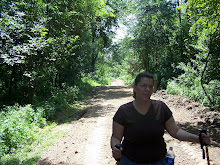 While I was down in St. Louis this past weekend, my father-in-law and I headed out to the History Museum while Jeff was sleeping. This is a beautiful museum in the middle of Forest Park and I'd been there a couple times before. The main exhibit this trip was on George Washington Carver and I have to say I learned more in the couple hours we were at the museum than I have in a long time. Carver was a fascinating man.
While I was down in St. Louis this past weekend, my father-in-law and I headed out to the History Museum while Jeff was sleeping. This is a beautiful museum in the middle of Forest Park and I'd been there a couple times before. The main exhibit this trip was on George Washington Carver and I have to say I learned more in the couple hours we were at the museum than I have in a long time. Carver was a fascinating man.Now I know what you're thinking. Peanuts. I must have learned all about the peanut. That is of course what Carver is known for. And it is true that before Carver, peanuts had primarily been used as hog feed. No one was growing them to eat. He really introduced how valuable a crop peanuts can be. But he also did the same thing with the sweet potato and the soybean.
I was fascinated by this exhibit because most of the issues that Carver talked about are issues that are affecting Iowa right now. When Carver, who was an Iowa State graduate, went down to Alabama he noticed that the only thing people were planting was cotton. And the soil was dying. Cotton, like corn, leeches the nitrogen from the soil. Carver realized that in order to survive, the soil needed crop rotation. If you live in the upper midwest this discussion should sound familiar. If it doesn't...well it should. We have been focusing on King Corn for a while, the same way Alabama focused on King Cotton. And the soil is dying.
Carver learned that crop rotation was the key but no one wanted to plant other crops. They didn't know what to do with them. So he taught them. He found 300 uses for the peanut, including oils, plastics, and of course food. He didn't invent peanut butter but he did make it better. He found hundreds of uses for the soybean. He taught out of the Tuskegee Institute which had no money for lab equipment. Carver worked with his students and took his ideas around the countryside, teaching the farmers. And farms prospered.
 Carver started his life in Missouri but his time in Iowa is what interested me the most. At a tough time for African-Americans he found a college (Simpson College in Indianola, Iowa) who accepted him. He graduated with a fine arts degree. He painted and played multiple instruments. Then he went on to Iowa State where he became an on campus sensation for his fantastic ideas not for the color of his skin. He could have easily stayed to teach at ISU but Tuskegee offered him the job and he had to go help. The man only took one raise in his life. He loved sharing his ideas and never once patented his inventions. Truly a modern day Renaissance Man. And a man who's ideas are still pertinent today.
Carver started his life in Missouri but his time in Iowa is what interested me the most. At a tough time for African-Americans he found a college (Simpson College in Indianola, Iowa) who accepted him. He graduated with a fine arts degree. He painted and played multiple instruments. Then he went on to Iowa State where he became an on campus sensation for his fantastic ideas not for the color of his skin. He could have easily stayed to teach at ISU but Tuskegee offered him the job and he had to go help. The man only took one raise in his life. He loved sharing his ideas and never once patented his inventions. Truly a modern day Renaissance Man. And a man who's ideas are still pertinent today. 

No comments:
Post a Comment